Have to/must 400 People tell their children they ____ throw things in the street mustn't 400 You _____ play on the road There are a lot of cars mustn't / can't 400 You _____ read a lot of books if you want a degree in English literature have to / must 400We use have to / must / should infinitive to talk about obligation, things that are necessary to do, or to give advice about things that are a good idea to do Mus t and have to are both used for obligation and are often quite similar They are both followed by the infinitive I must go nowHave to, don't have to, must, mustn't (1) Type the correct answer into the box Use contractions where possible Youhave a passport if you want to travel abroad Youarrive late Youstand on the plane There are seats for everyone

Modal Verbs Can Can T Must Mustn T Have To Don T Have To Ppt Download
Have to must can could exercises
Have to must can could exercises-Unlike "must" where we just make an inversion to create the interrogative,There's enough food 10 You mustn't don't have to put salt in her food;




Modal Verbs Bingo Card
Let's find out in today's Confident English lesson Need to vs have to vs must can be used as synonyms Sometimes That's the good news Generally, they all mean that you're talking about a responsibility, an obligation, or something that is important to do This is where they are similar"Must" el emisor impone una obligación "Have to" el emisor no impone ninguna obligación, se limita a comunicar una obligación que existe (Teacher) You must do your homework (El profesor impone el deber de hacer los deberes) (Student) I have to do my homework (El estudiante se limita a comunicar una obligación que le ha sido impuesta)Have to è usato per esprime un obbligo o una necessità La forma affermativa di Have to ha lo stesso significato di Must (ma è meno forte) La forma
Must se refiere a una obligación entre dos personas, o una obligación que sientes Y have to se refiere a una obligación externa las reglas, la ley, algo que tienes que hacer y punto Normalmente en mis clases explico que have to es algo que si no lo haces, hay consecuencias I have to get up early tomorrow Can we always use them in the same way?As we can see, the inversion is the only thing that changes from the structure in the affirmative How do we make questions with "to have to"?
I must go to the doctor I must get up early tomorrow You mustn't call me before 8 It is used to describe something that the speaker thinks is necessary to do You must eat less candy I must try to do more exercise We can also use must to express strong advice You must see the new film;Los verbos modales "can't have" / "must have" / "might have" Verb conjugation practice Contenido de suscripción Los verbos modales must, have to, should, should have Modals must, have to, should, should have passive Dictation exercises focus on grammar Contenido de suscripción Los verbos modales must, have to, should, should haveYou can do this grammar quiz online or print it on paper It tests what you learned on the have to, must page 1 Yesterday I ________ finish my geography project must mustn't had to a) must b) mustn't c) had to 2




Ana S Esl Blog Modal Verbs




Ana S Esl Blog Modal Verbs For Eso 3 Students
We use "have to" for obligation We use "don't / doesn't have to" for no obligation We use "can't" to say that something isn't allowed Can and Have To Choose the correct answer Start Quiz Speak English Fluently!Must vs have to Both Must and have to express obligation or necessity, but there are some small differences • Must expresses the speaker's feelings, whereas have to expresses, above all, an impersonal idea You must come You are obliged to come (I require that you come) You have to come You are obliged to comeShould / Must / Have to Should Se utiliza para dar consejos Se indica que algo es bueno y por lo tanto se debería hacer Es una recomendación, no una obligación Tiene menos fuerza impositiva que "must" y que "have to" If you feel bad you should go to




Must Vs Have To Must Not Vs Don T Have To 7esl English Language Teaching Learn English Grammar Teaching English Grammar




Must Have To Exercises
Have to , mustn't , needn't 1 The use of must, must not (mustn't) and need not (needn't) The modals must, must not and need not have the same form regardless the subject There is no ending with he/she/itHave to, must Have to is NOT an auxiliary verb (it uses the verb have as a main verb) We include have to here for convenience Must is a modal auxiliary verb In this lesson we look at have to, must and must not, followed by a quiz to check your understanding have to for objective obligation We often use have to to say that something is obligatory, for example Children haveCopy of must mustnt have to dont have to nee Fr 1 can, want, would like, must/have to Une las correspondencias por Sgoldberg1
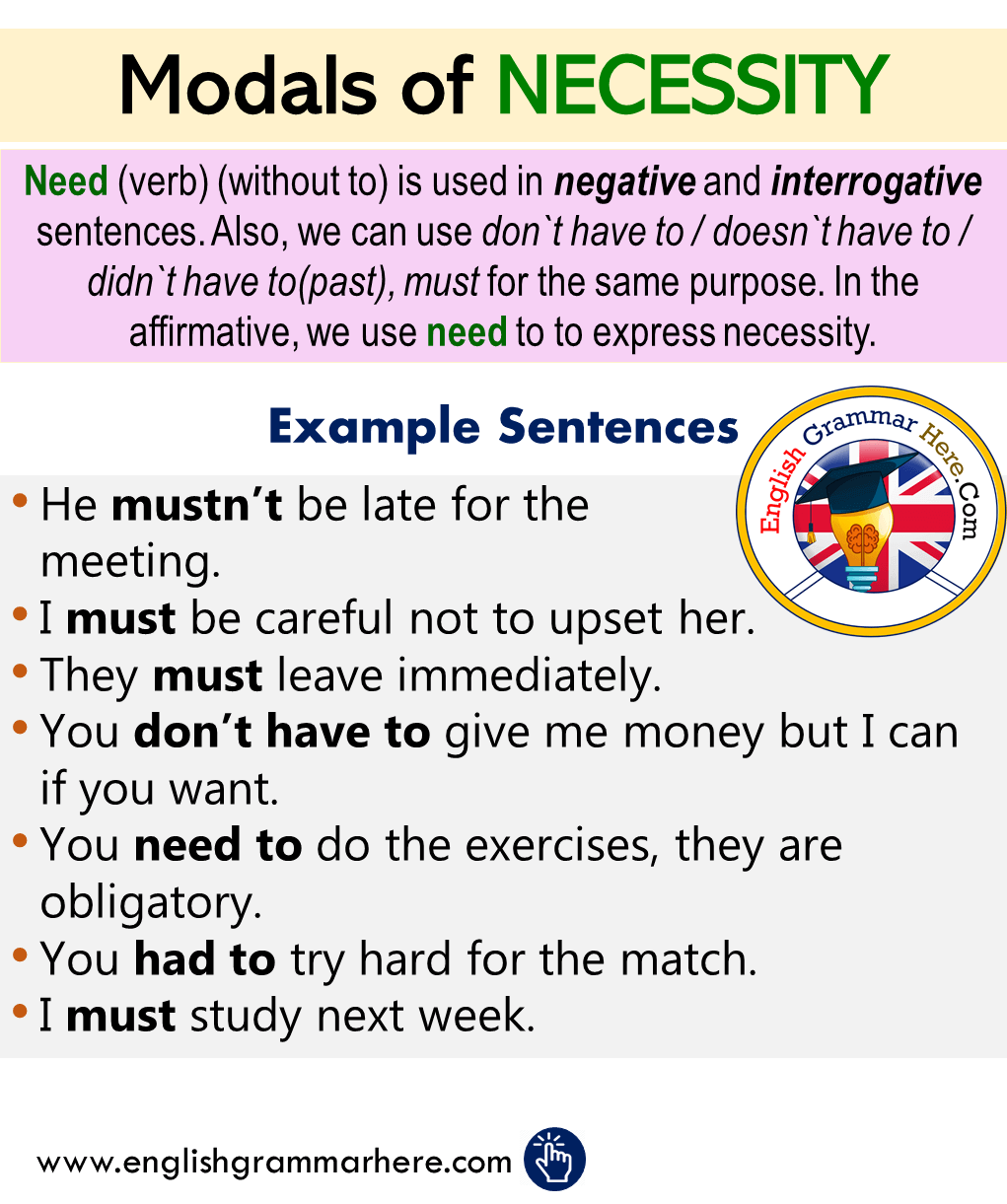



English Modals Of Necessity Definitions And Examples English Grammar Here



Understanding Modals Of Necessity Must Have Got To Have To Infographic Grammar Newsletter English Grammar Newsletter
Sometimes, "must" and "have to" can be used to speak about responsibilities However, "must" is generally used for strong personal obligations and "have to" is used for responsibilities at work and in everyday life I must do this right now!While Must can generally be replaced by Have to in the present tense, there is sometimes a slight difference in meaning or use Let's look at our previous example using MUST I must write a letter to John We generally use must when the speaker decides that something is necessary, or Must can be replaced by Have to with little difference in meaning You have to study (= you must study) He has to finish the report by Friday (= He must finish the report by Friday) They have to resit the test (= They must resit the test) Have to is a more informal while Must is mostly used in written orders or instructions




Ana S Esl Blog Modal Verbs For Eso 3 Students




Must Mustn T Can Have Don T Have To English Esl Worksheets For Distance Learning And Physical Classrooms
Can/could/may Must/have to cours Après avoir étudié et différencié l'expression de l'incertitude d'une action test, nous allons maintenant nous pencher sur d'autres 'valeurs des auxiliaires modaux' concernant la liberté d'agir du sujetCan / could exercises May / might Must / have to Shall / should Will / would Mixed modals exercises Had better Worksheets handouts HomeMustn't don't have to cook more;




Modals Modal Verbs Types Of Modal Verbs Useful List Examples English Grammar Youtube
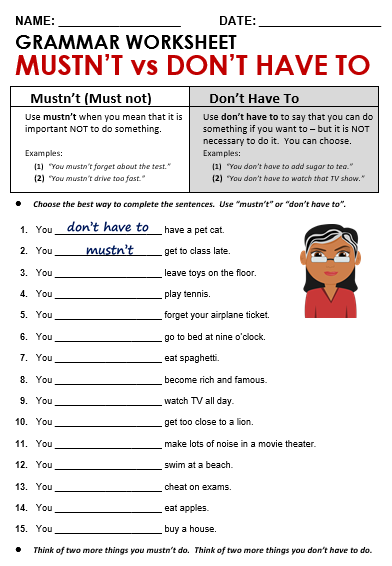



Must Necessity All Things Grammar
Must English Grammar Today a reference to written and spoken English grammar and usage Cambridge Dictionary 1 Must and Have To Must and have to are both used to talk about obligations things you cannot choose not to do For example We must talk to her before she leaves I have to go into work early tomorrow If you say, We must talk to her before she leaves, you mean that you think this is very important, and you need to do it When you say, I have to go into work early While must is a modal verb, have to is a semimodal verb, in the sense that as a modal verb it is used along with the verb to express necessity, but acts like a normal verb in its formulation Both must and have to talks about obligation, but must highlight a personal obligation, and have to outlines an external obligation




The Modal Verb Must In English Also Must Vs Have To Modalverbs English Grammar English Language Learning Woodward English
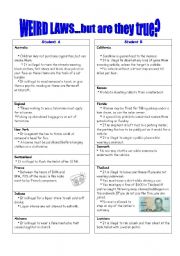



English Exercises Can Or Must
Wenn du sagen möchtest, dass du etwas nicht tun musst, dann verwende need not, nicht must not(Möchtest du must verneinen, dann verwende not allowed to) Outline Ask students to talk about their daily routines Have them make a list of five things that they have to do every day Introduce the grammar by having the students take a look at the grammar sheet below Discuss the differences between 'have to' and 'must' in the positive form Make sure to point out that 'have to' is used for dailyLiczba wyników dla zapytania 'can could must have to' Shopping GG3, can, should, must, have to Koło fortuny wg Poliakowa1




Must Mustn T Can Have Don T Have To English Esl Worksheets For Distance Learning And Physical Classrooms
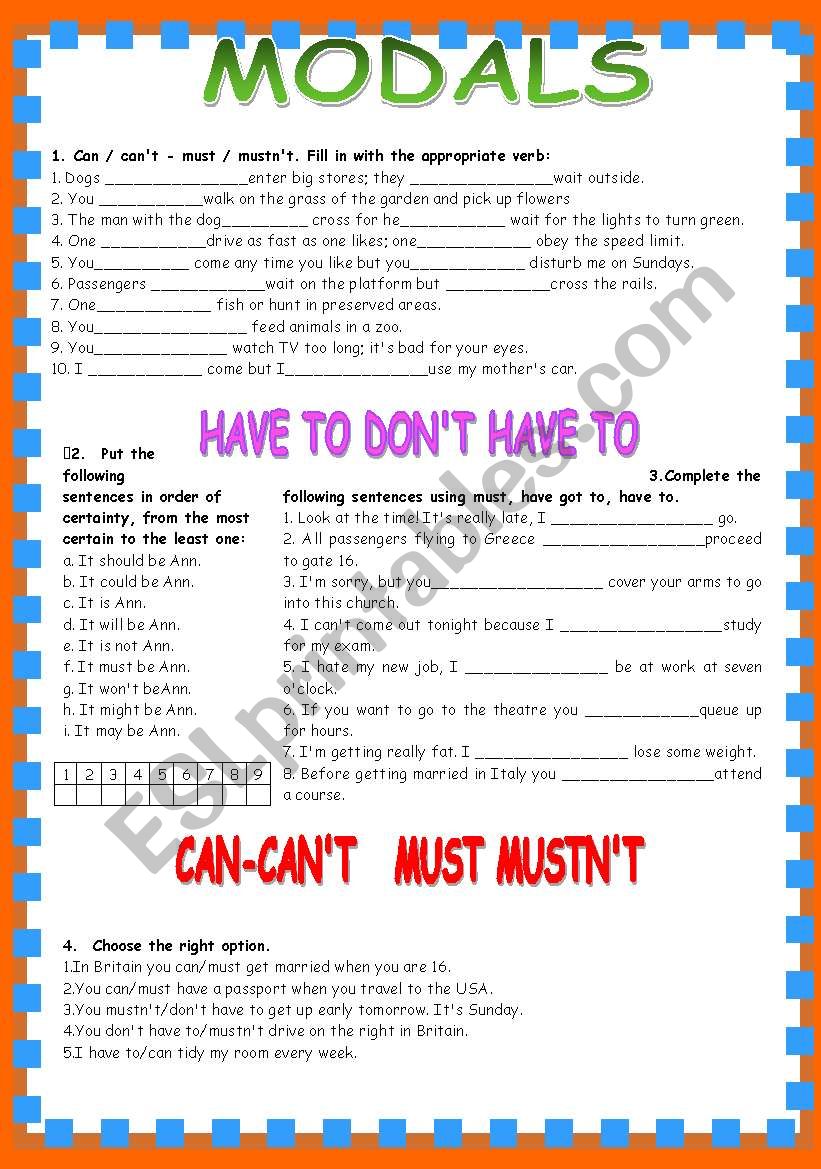



Modals Can Can T Have To Don T Have To Must Mustn T Should Shouldn T Esl Worksheet By Patties
Can vs Be Able To With Tenses 3 Can vs Could Exercise 4 Can Can't Exercises 567 Mustn't vs Don't Have to Exercises 1 / 2 / 3 10 Must vs Have to / Has to Exercises 1 / 2 / 3 11 Must / Mustn't / Needn't / Have to 1213 Modals With Passive Voice 1 / 2 14 Mustn't vs Needn't vs Can't Similar Exercises MODALS V3 Practice Test Ought toMust Have to 1 ใช้ในกรณีที่เป็นความต้องการของเราเอง 1 ใช้ในกรณีที่เป็นสิ่งจำเป็นต้องทำ อาจเป็นกฎหรือข้อบังคับ On the other hand, "must" is used to convey a stronger meaning than simply "have to", it's more forceful "You must be here by 100pm" In this sentence, the use of "must" gives more import to the need to be here by 100pm However, it can also be used to show that something is logically the result of something else




Modals In English Panosundaki Pin
(108).jpg)



Modal Verbs Quiz Questions Exam Proprofs Quiz
Both must and have got to can be used to talk about necessity They are usually interchangeable;* MUST indicates an obligation felt by the speaker ex I must go now, as I still have a lot of homework to do * HAVE TO insists on pure facts and regulations ex You have to leave now !Must* changes to 'had to'should have pp / shouldn't have pp a past action which didn't happen the advice / regret is too late You should have gone to bed earlier, now you have missed the train a past action which didn't happen the advice / regret is too late You shouldn't have taken that job, it was a bad idea




Modal Verbs Bingo Card




Must Vs Have To Easy English Conversation Practice Learn English Mark Kulek Esl Youtube
Should have Nós usamos "should have" para dar, ou pedir uma opinião no presente sobre algo que aconteceu no passado "I had a terrible stomachache" "You should have gone to the doctor's" "I didn't hear from my father last week" "You should have called him" "She isn't happy with the salary she's getting"Oh, we can't park here You can't take photos in the museum They're really strict about it Sorry, we can't sell knives to under18s must not/mustn't We use must not to talk about what is not permitted It is common on public signs and notices informingMUST HAVE TO must et have to sont utilisés pour exprimer une obligation ou la nécessité qu'une chose soit faiteIls peuvent souvent être utilisés indifféremment, mais il y a une légère différence de sensIls sont suivis de la base verbale (le verbe sans




Modal Verbs Must Have To Can Could Should Mustn T Don T Have To Can T Couldn T Shouldn T Ppt Download
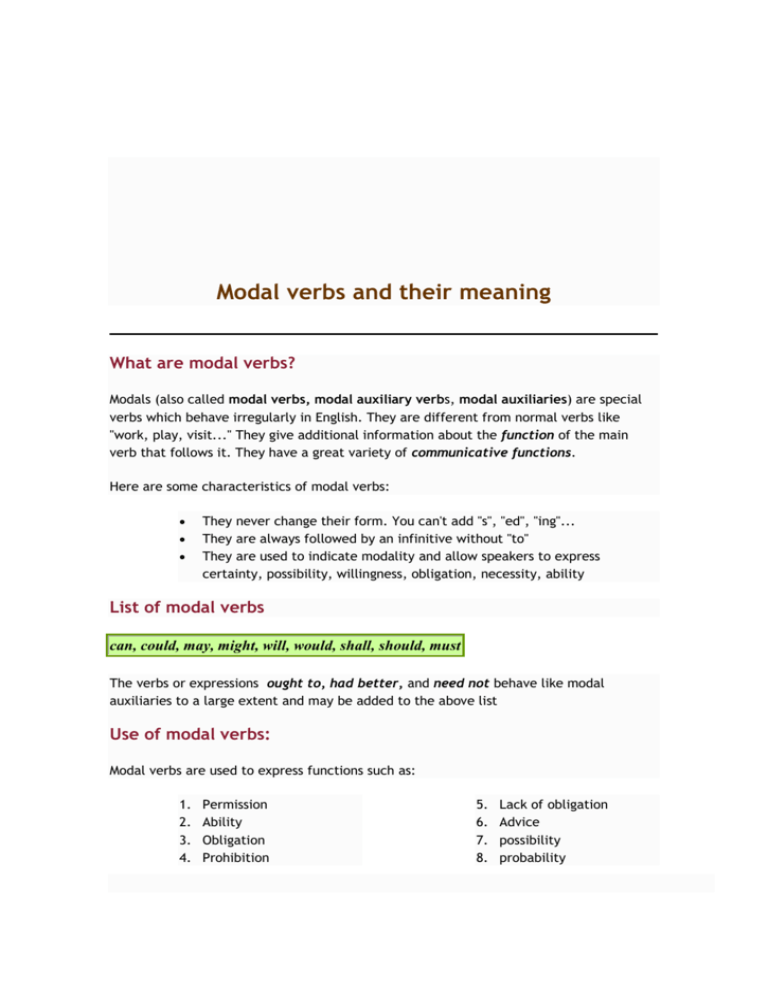



Modal Verbs And Their Meaning
4 rindas 2) In the negative HAVE TO has a different meaning "you don't need to dot that" It's Sunday!However, have got to is mainly used to talk about obligations that come from outside On the other hand, must is mainly used to talk about the feelings and wishes of the speaker and the hearer In American English, have to is more common than must Complete the following sentences using mustMust I chair the meeting?



1




Modal Verbs Grammar Drills Linguistic Typology Linguistic Morphology
The doctor said she can't eat salt Loading must/mustn't, have to/don't have to – form Download fullsize image from must/mustn't"He can't be home so early" (certainty that something is impossible) "You can't go to the toilet now" (lack of permission) necessity, obligation, certainty that something is true* The absence of necessity minimizes the restriction of freedom It can be expressed in three different, but equivalent, ways




English Grammar Modal Verbs Eslbuzz Learning English




Modal Verbs Can Must Mustn T Should Have To Worksheet
MUST HAVE TO The speaker thinks it is necessary, or it is the rule The obligation comes from an external source ♦ I must buy flowers for my mother (It's her birthday and I decide to do that) ♦ I have to buy flowers for my motherinlaw (It is not my decisionIn English, we use "must" and "have to" to express a strong rule or law In this grammar les Do we say "I must do my homework" or "I have to do my homework"?I'm Clare, an English teacher and the founder of this site




Modal Verbs Modals Are Helping Verbs That Do
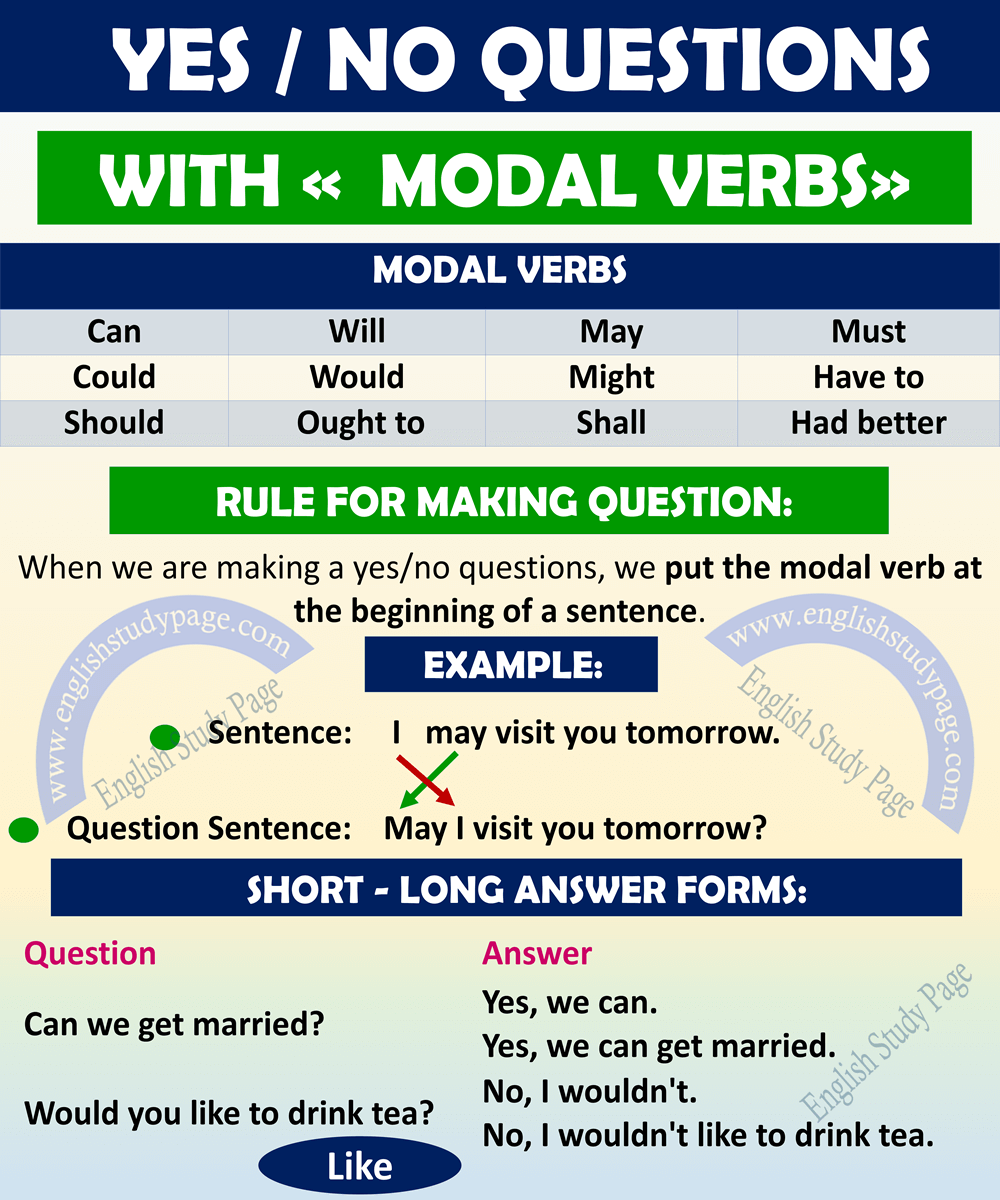



Yes No Questions With Modal Verbs English Study Page
1 Die Verwendung von must, must not (mustn't) und need not (needn't) Die Modalverben must, must not und need not sind in allen Personen gleich Es wird auch bei he/she/it keine Endung angehängt Achtung!PERMISSION and OBLIGATION CAN and HAVE TO Show all questions 1 / 13 She wear any clothes she likes can can't have to don't have to You take picturesNo visits after six !



Modal Verbs Must Should Have Has To Lessons Blendspace
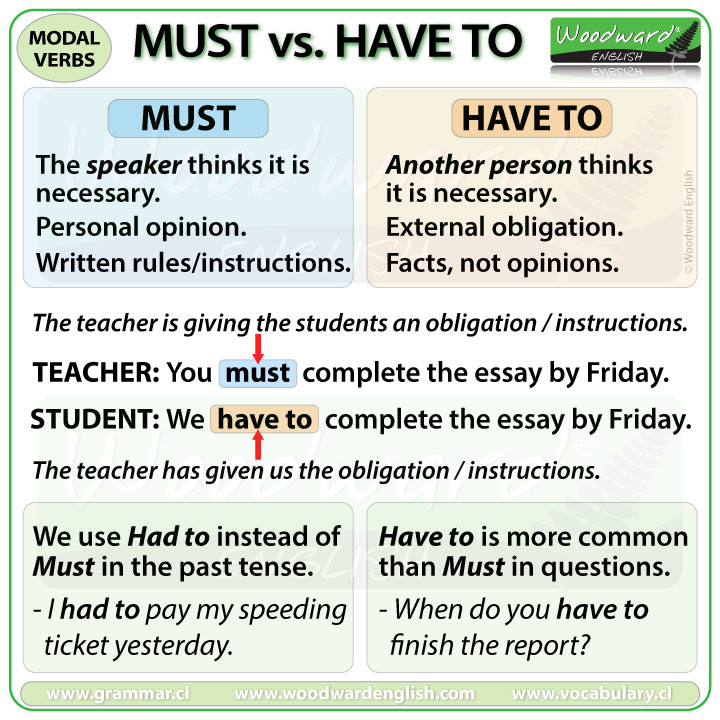



Must Vs Have To Woodward English
• Have to drückt eher übliche oder gewohnheitsmäßige Pflichten aus, während must eher für punktuelle, gegenwärtige Pflichten eingesetzt wird I have to brush my teeth twice a day Ich muss zweimal täglich meine Zähne putzenWe use can't to talk about something that is against the rules, particularly when we didn't make the rules What does this sign say?Use Must for personal duties and Have To for obligations More Practice https//youtube/M6zvuKb4ChU Everyday activities Learn English Mark Kulek ESL




Modal Verbs Must Have To Can Should Con Ejemplos Y Explicado En Espanol Idiomas Youtube



Speculation And Deduction Modal Verbs
Video must / have to Can / could exercises May / might Must / have to Shall / should Will / would Mixed modals exercises Had better Worksheets handouts




Modal Verbs Can Can T Must Mustn T Have To Don T Have To Ppt Download




Modal Verbs Activity For Pre Intermediate



Certainty Probability Possibility Modal Verbs




Modal Verbs Must Have To Have
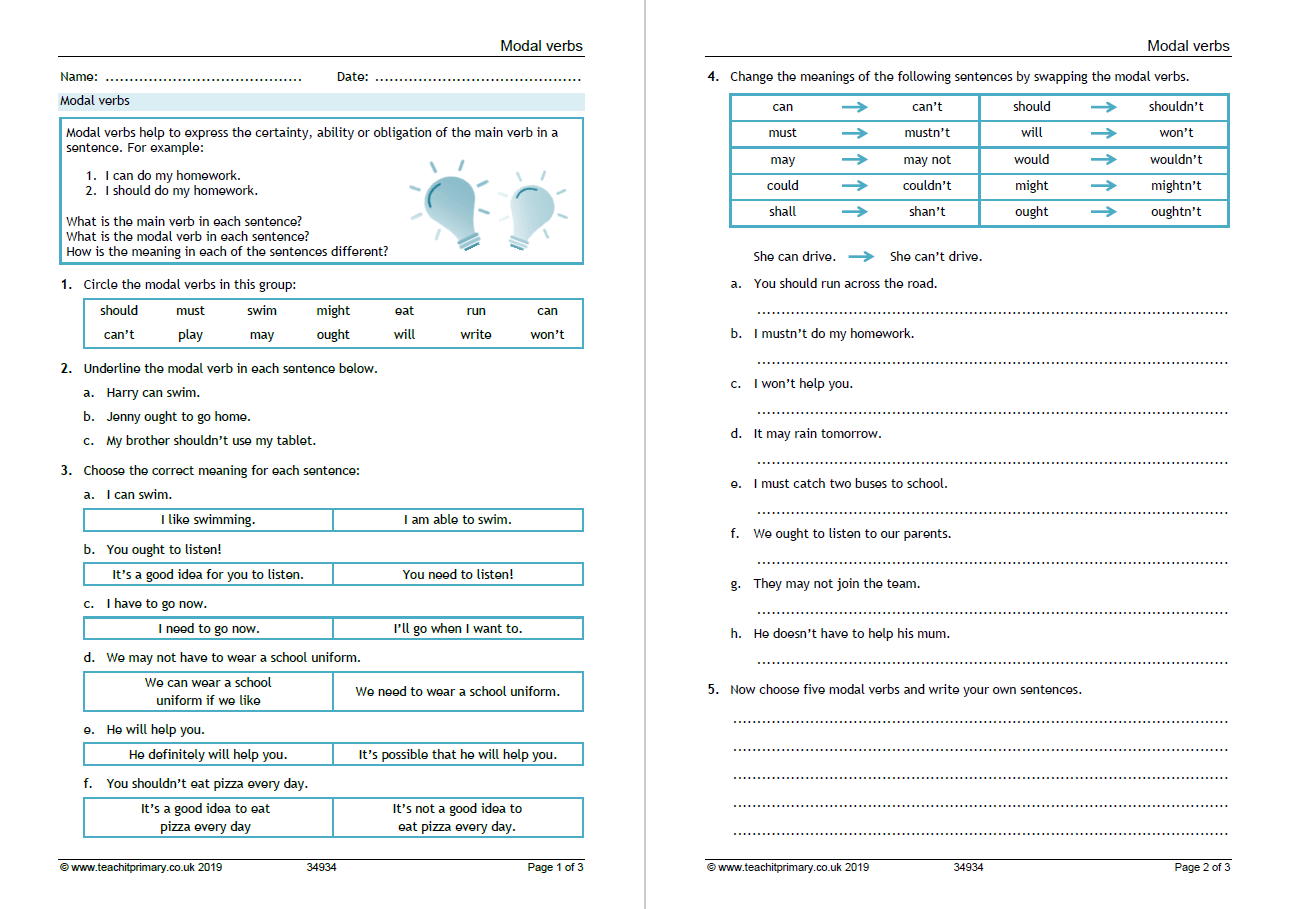



Modal Verbs 8 Of The Best Examples Activities And Resources For Ks2 English Spag



1




Must Vs Have To Woodward English




Mustn T Must Can T Online Presentation




Must Vs Have To Woodward English




A Brief Guide To Using The Italian Modal Verbs Volere Dovere Potere Smart Italian Learning




Modal Verbs Must Have To Can Could Should Mustn T Don T Have To Can T Couldn T Shouldn T Ppt Download



Fadeibuoni Files Wordpress Com 17 03 Musthaveto2 Pdf
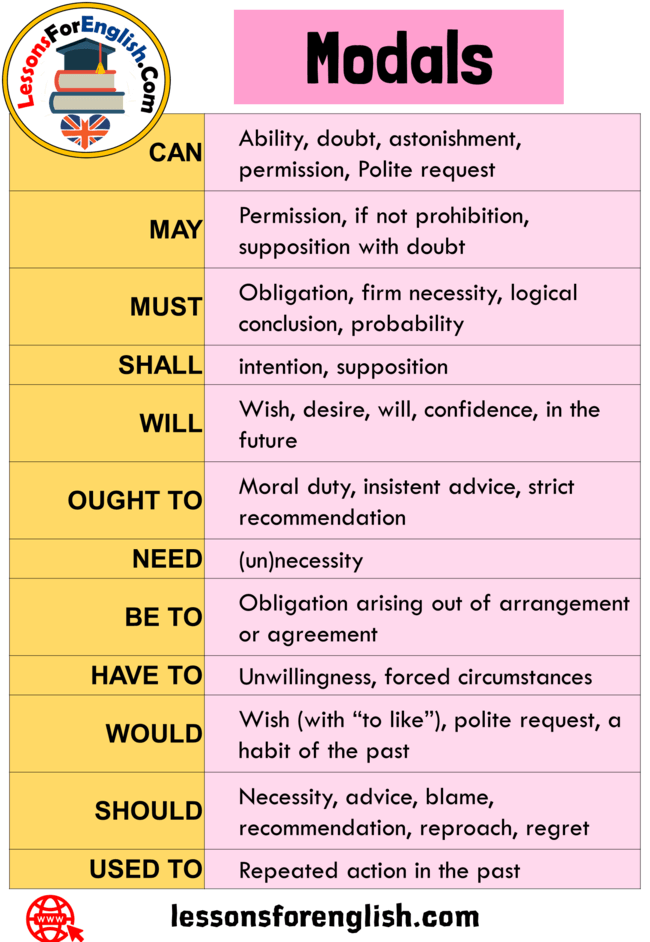



Modals Can May Must Shall Will Ought To Need Be To Have To Would Should Used To Lessons For English



1




Modal Verbs Can Could Should Must English Quizizz




Modal Verbs Must Mustn T Can Worksheet




English Grammar Must And Have To Mustn T And Don T Have To Eslbuzz Learning English English Grammar Learn English Teaching English Grammar
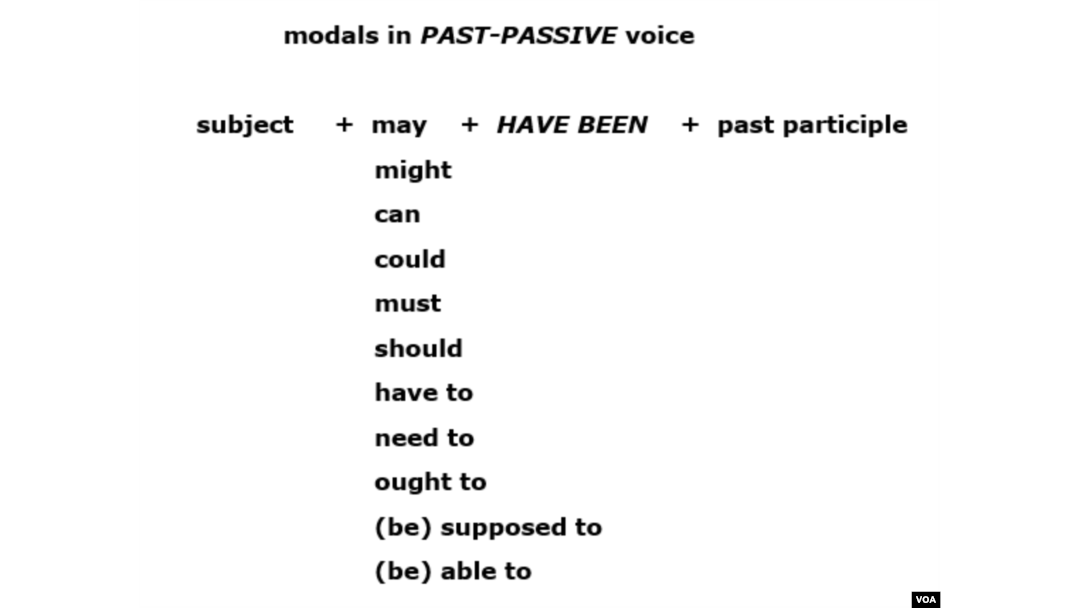



Learning Passive Modals It Can Be Done



Modal Verbs L Can L Could L May
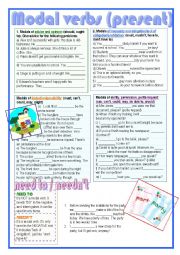



English Exercises Modals Should Shouldn T Mustn T
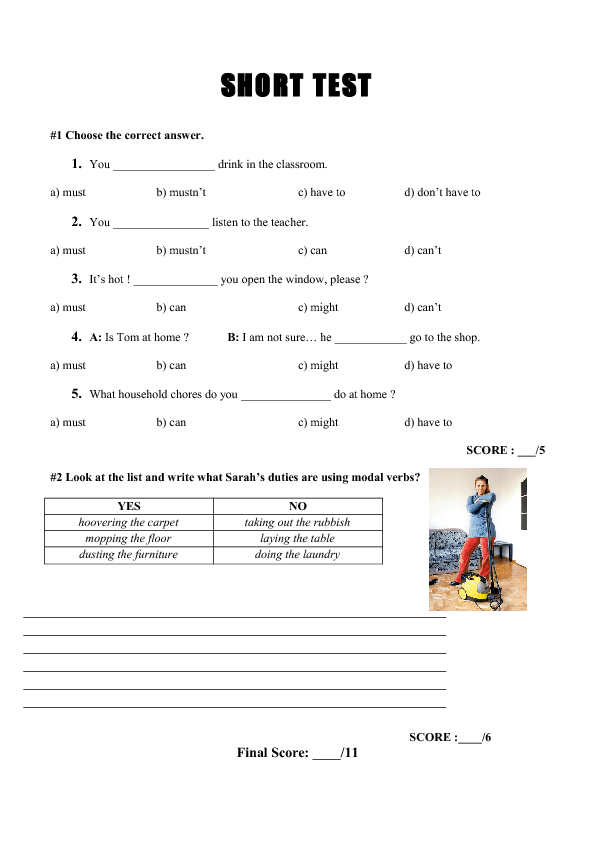



Modal Verbs Test Must Have To Can Might



Pronunciation Of Must Mustn T The Crazy Teacher S Blog The Crazy Teacher S Blog




Unit 13 Language Study Word Study Modal Verbs Yan Dang Mountain Ppt Download




Must Or Have To Worksheet




81 Free Must Worksheets
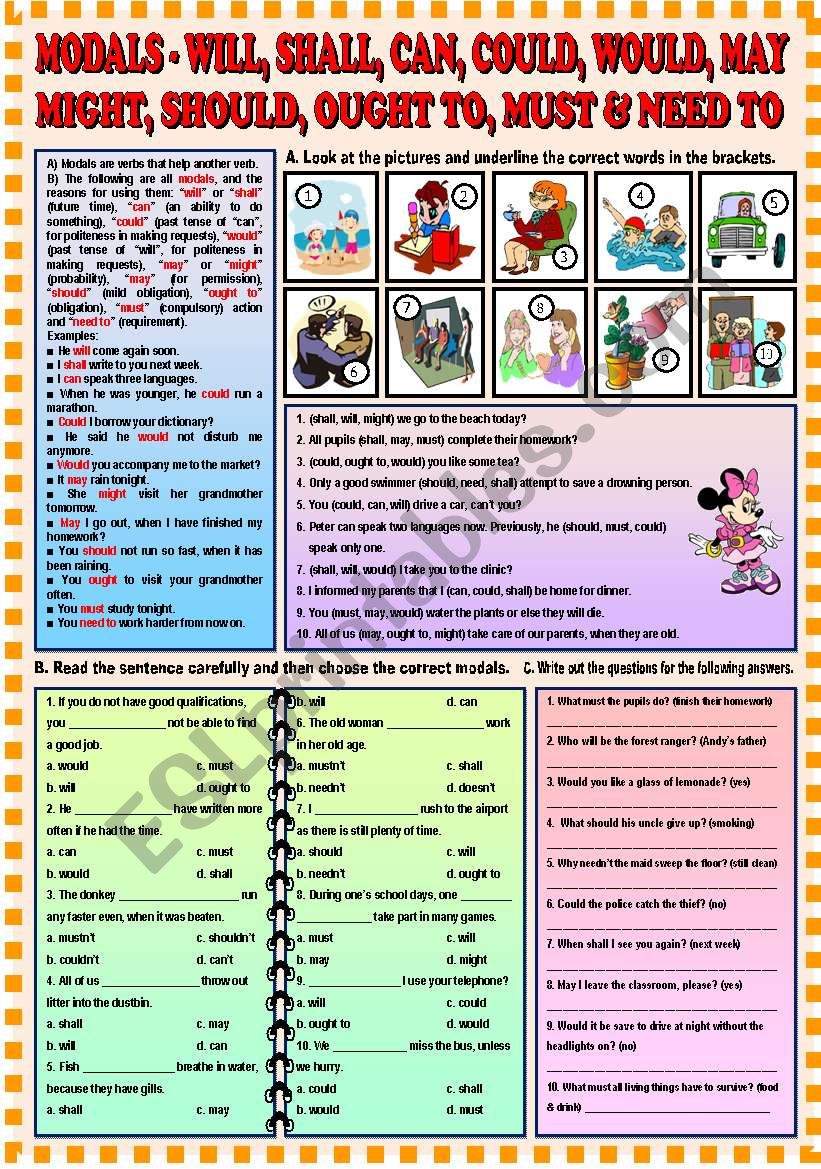



Modals Will Shall Can Could Would May Might Should Ought To Must Need To Key Esl Worksheet By Ayrin
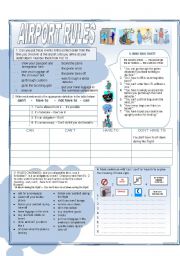



English Exercises Can Or Must




Modals Can May Must Worksheet




Modals Of Deduction Might May Can T Must Worksheet




G4ecc41g1zjegm



3




How To Use Must Would Shall Should Will Would May Might Must Youtube
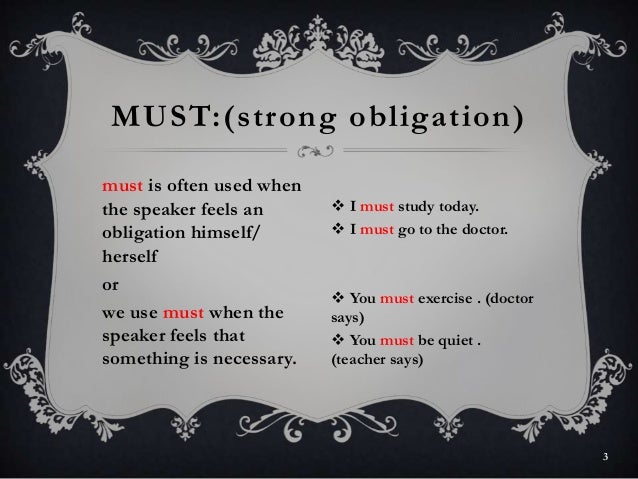



Modal Verbs Must Have To Should Ought To May Might Must Can Have P P



General Rules Modal Verbs
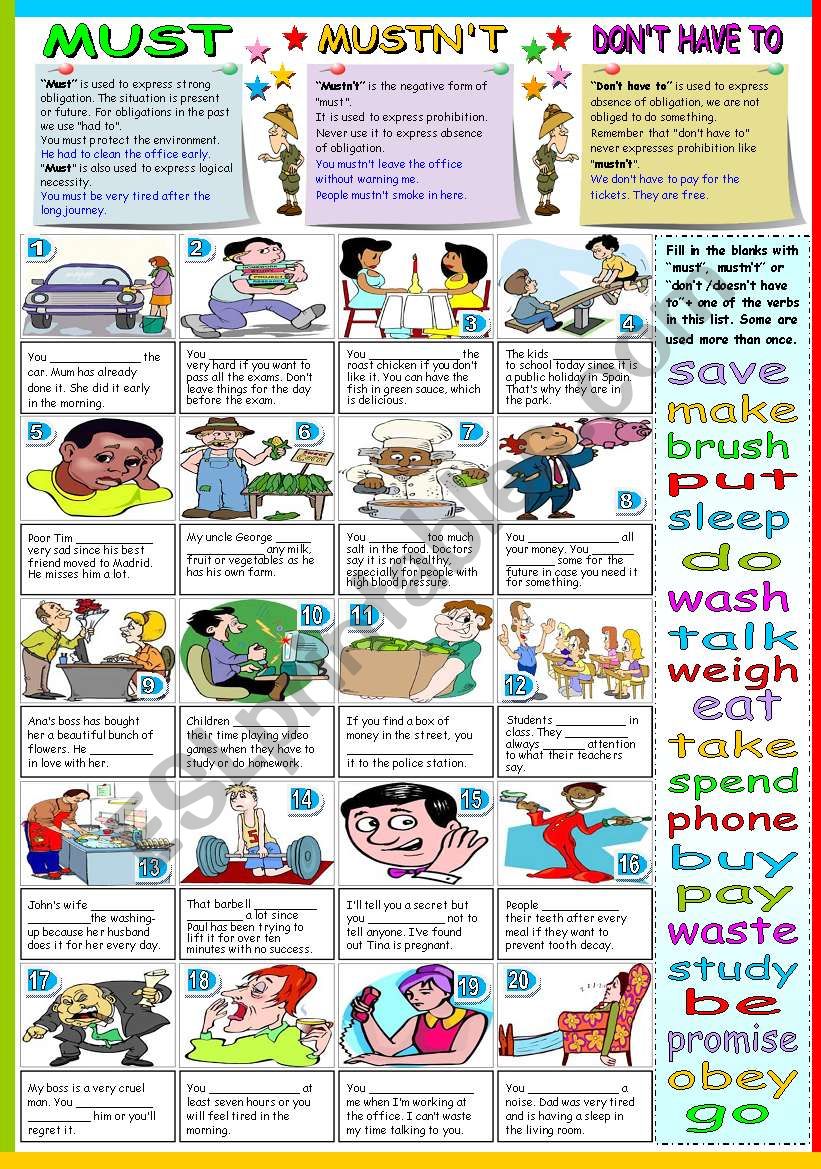



Must Mustn T Don T Have To B W Version Key Included Esl Worksheet By Katiana




Must English Grammar English Grammar English Language Learning English Verbs




Elementary Modals Worksheet
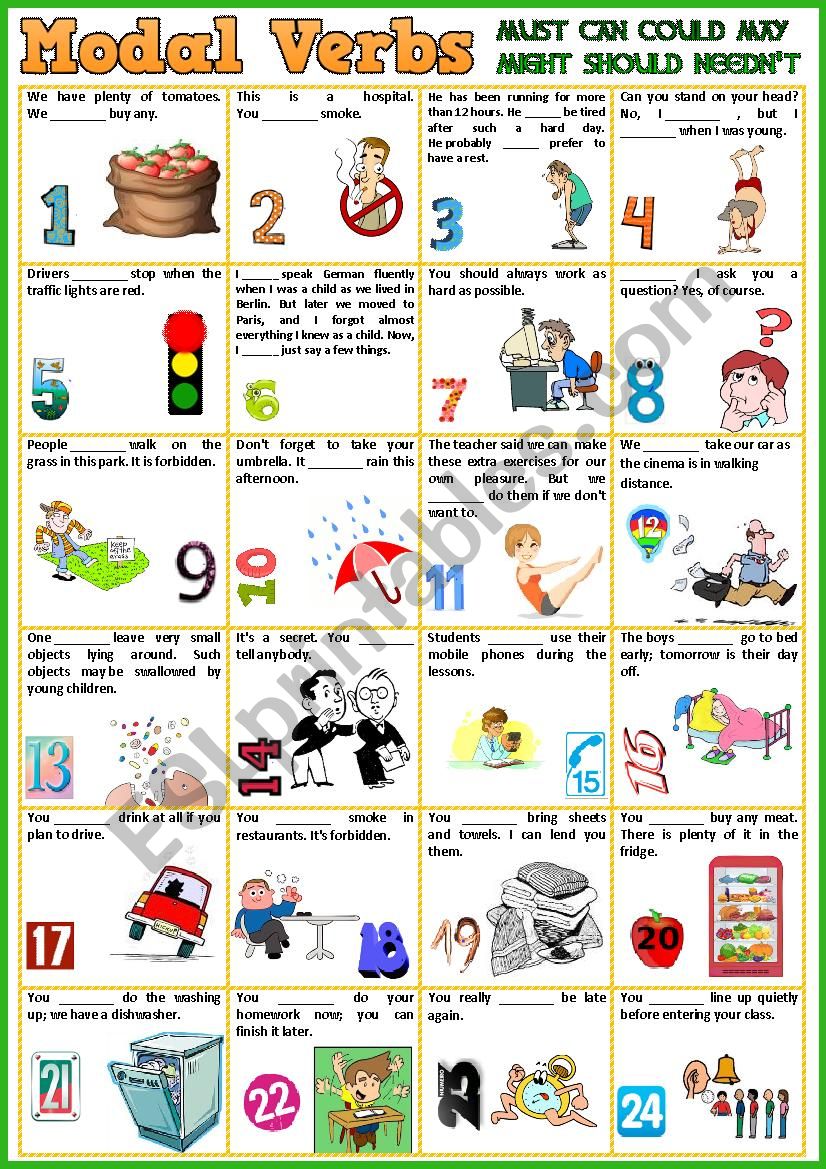



Modals Verbs Must Can Could May Might Should Needn T Key Esl Worksheet By Karagozian
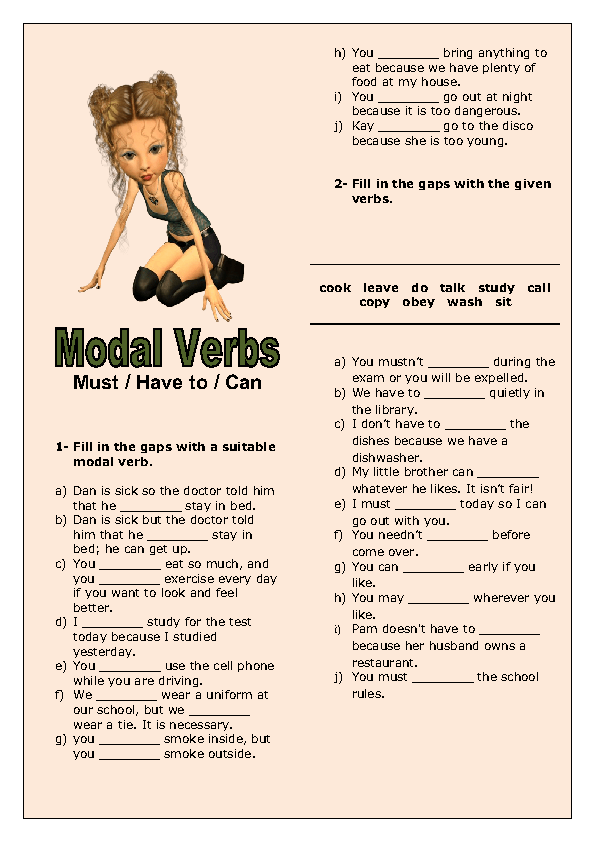



57 Free Have To Worksheets




Modal Verbs Flashcards Quizlet




Modals Can Could May Might Should Have To Must
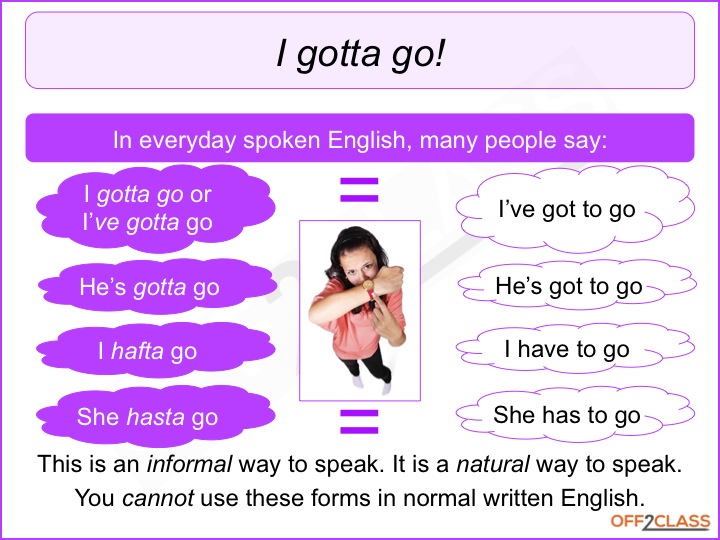



Teaching Must And Have To Necessity Modals Off2class




Test English Prepare For Your English Exam
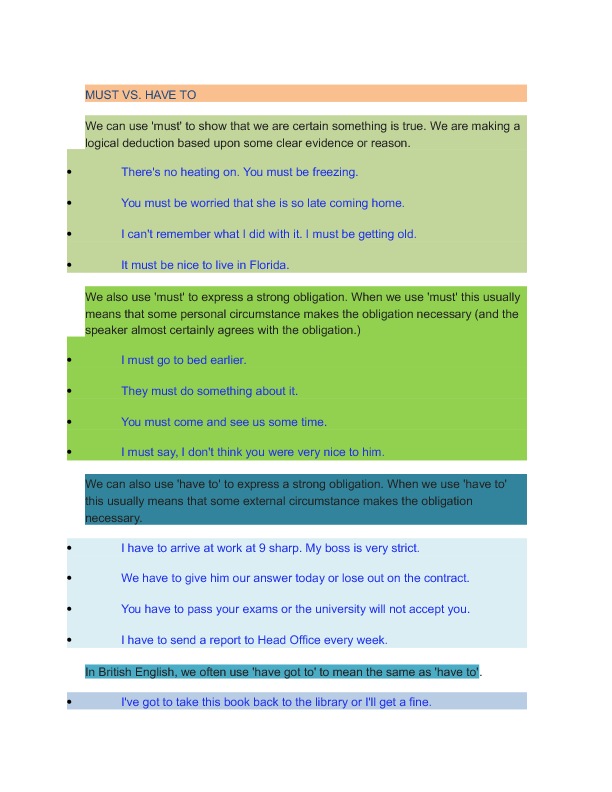



81 Free Must Worksheets
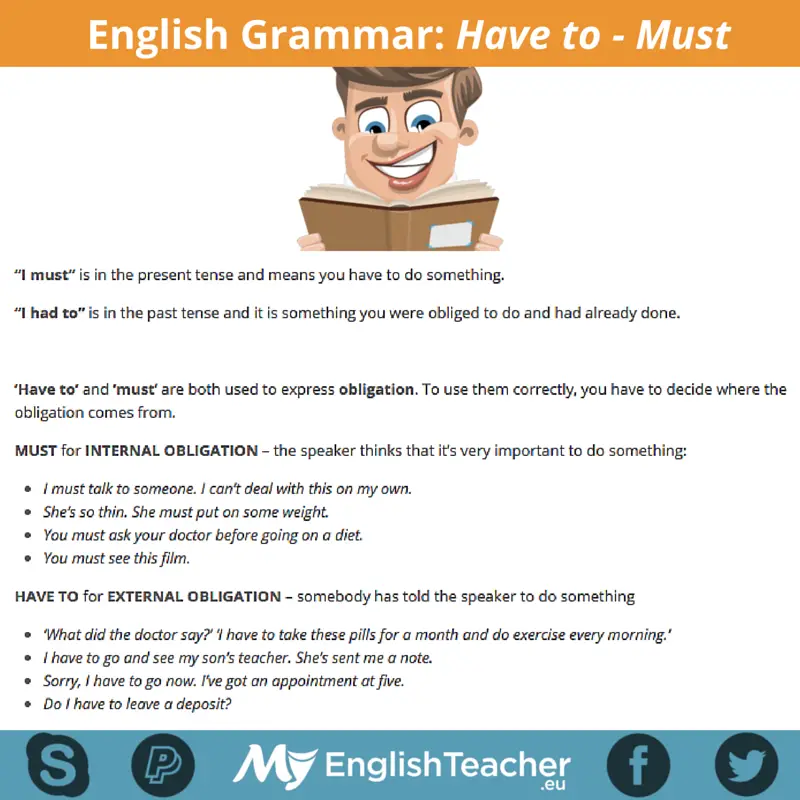



I Had To I Have To Or I Must What Is The Difference Myenglishteacher Eu Blog




Can Must Should English Esl Worksheets For Distance Learning And Physical Classrooms




Test English Prepare For Your English Exam




Modal Verbs Reading Text Photocopiables




Must Mustn T Can Can T Have To Don T Have To English Esl Worksheets For Distance Learning And Physical Classrooms




Mustn T Vs Don T Have To What Is The Difference Youtube



Difference Between Have To And Must Difference Between




How To Teach May Might Could Must Off2class
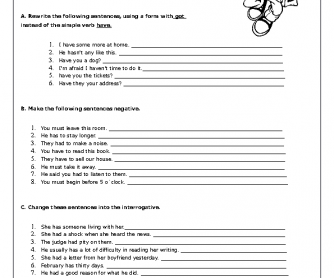



81 Free Must Worksheets




7c Have To Don T Have To Must Mustn T Ppt Download




Must Mustn T Can Have Don T Have To English Esl Worksheets For Distance Learning And Physical Classrooms




Modal Verbs Modal Verbs Must Should Can Could




57 Free Have To Worksheets
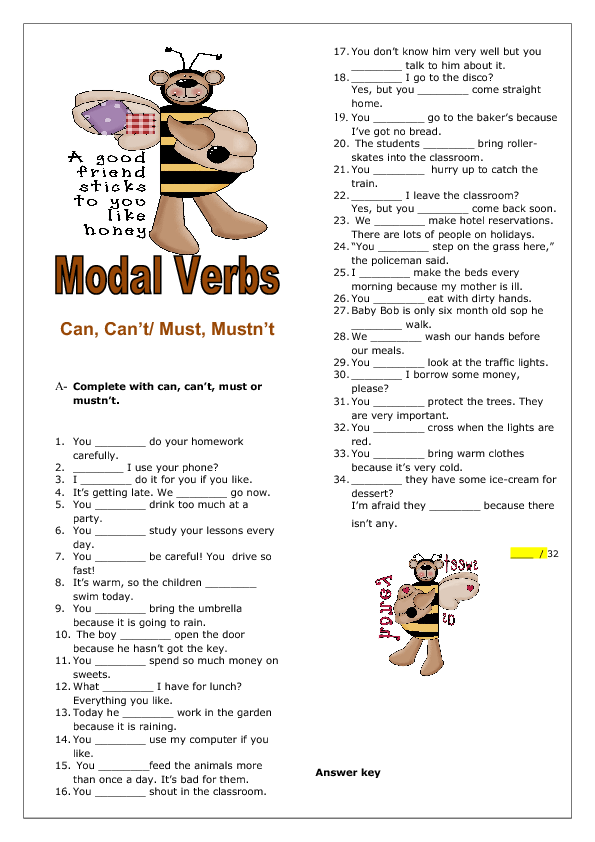



Can Can T Must Mustn T Elementary Worksheet



Modal Verbs Different Usage And Meanings A Handy Summary




How To Teach May Might Could Must Off2class
/sign-warning-people-of-fines-for-feeding-wildlife-in-a-park-at-arakoon-in-new-south-wales--australia-847527992-5bc9d8c246e0fb0026d028e0.jpg)



How To Use Must Have To And Need To In English




Modal Verbs




Teaching Must And Have To Necessity Modals Off2class
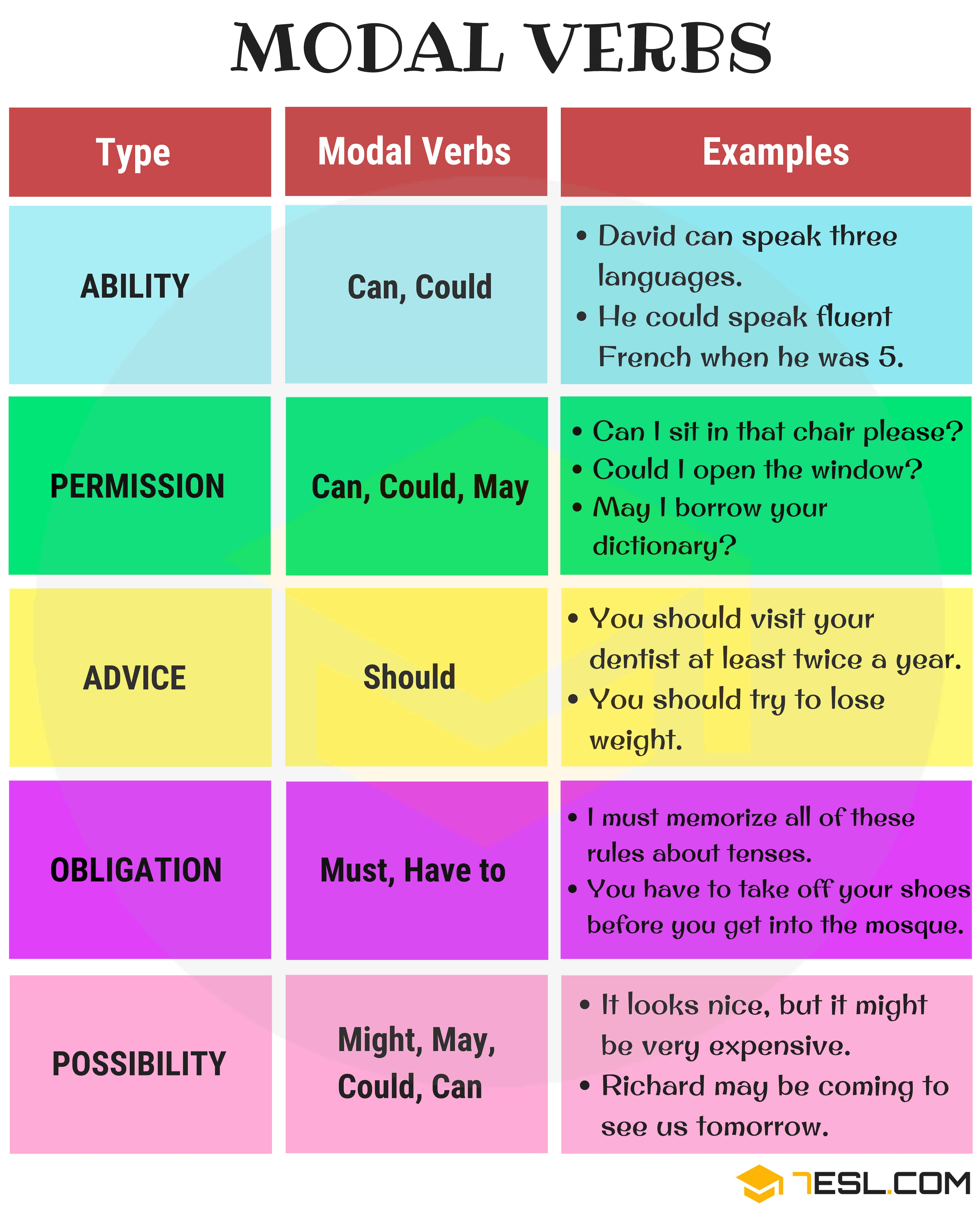



Modal Verbs A Complete Grammar Guide About Modal Verb 7esl



English Worksheets Must Have To Worksheets




Modal Verbs Can Could May Might Should Ought To Must Have To Ppt Video Online Download




What Is Obligation In Modals Know It Info




Test English Prepare For Your English Exam
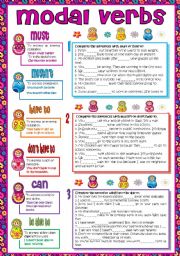



Modal Verbs Must Mustn T Have To Don T Have To Can Be Able To Esl Worksheet By Esther1976




Modal Verbs What Are Modal Verbs




Class Rules Modals Teaching Material




Modals Permission And Obligation Grammar Intermediate To Upper Intermediate British Council




Expressing Must Can T Should Needn T Might May Could Have English Learn Site




Meaning Examples Can Could May Might Will Would Shall Should Must Shakespeare S English


